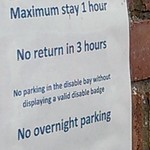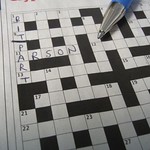An unfortunate omission?
Read MoreDraconian measures. Photo by Terry Freedman
Language

Draconian measures. Photo by Terry Freedman
An unfortunate omission?
Read More
Ogam inscription on a stone seen at the British Museum. Photo by Terry Freedman
Have you ever heard of Ogam? Me neither. This article gives provides some information about this ancient writing system.
Read More
Diverted Traffic, by Terry Freedman
People should say what they mean. One way of doing so would be to use the correct word. Another way would be to use objective facts rather than subjective value judgements.
Read More
Photo from Stencil. Licence: CC0
Another article in the 'bad writing' series, 7 Features of Bad Writing suggests some common characteristics of poor prose. Any one of these 'sins' would serve as an indicator, especially if they occur more than once or twice.
Read MoreYou cannot assume that every reader will know what words like 'etc' will refer to or included.
Read MoreThis book may be thirty years old, but its advice is still pertinent. If you want to have a blitz or crackdown against, or shake-up of, bad writing (all examples of 'tabloidese'), then this is the book for you.
Read MoreWhy do some writers write badly?
Read More
OK, so this is a review of a fiction book -- but I think we can learn a lot about great use of language, convincing research and pace from reading it.
Read More
A dictionary is an invaluable resource. Photo from www.pixabay.com CC0
If you want to make sure that you use the correct word more often than not, you gotta have a plan.
Read More
Man, is that writing horrible! Photo from www.pixabay.com
News about a website that provides copious examples of dreadful language use: curate, driven, iterate -- it's all there. Read it and cringe.
Read More
We should disinfect our writing against ugly language! Picture from www.pixabay.com CC0
Management-speak, clichés and just plainly ridiculous terms that nobody uses in their normal everyday lives should have no place in our writing.
Read More I think this notice about parking illustrates why it’s not a good idea to rely solely on yourself when it comes to proofreading and editing. The notice contains two errors that could, and should, have been avoided.
I think this notice about parking illustrates why it’s not a good idea to rely solely on yourself when it comes to proofreading and editing. The notice contains two errors that could, and should, have been avoided. If, like me, you have a love of language, you should explore the strange world of the cryptic crossword. Unlike the plain crossword, the cryptic variety requires more than providing a synonym for a word or phrase. Rather, it involves working out what the clue is getting at.
If, like me, you have a love of language, you should explore the strange world of the cryptic crossword. Unlike the plain crossword, the cryptic variety requires more than providing a synonym for a word or phrase. Rather, it involves working out what the clue is getting at.
That sounds much more difficult than the task facing you in an ordinary crossword, doesn't it? In fact, much of the time it's easier, for one simple reason.
 New words are always interesting, I think, and not just the ones that have been inspired by technology. But before I say any more about that, I feel the need to get something off my chest. Don’t worry, I won’t make this a long post: the last thing I want is people tweeting me to say TL;DR (too long; didn’t read).
New words are always interesting, I think, and not just the ones that have been inspired by technology. But before I say any more about that, I feel the need to get something off my chest. Don’t worry, I won’t make this a long post: the last thing I want is people tweeting me to say TL;DR (too long; didn’t read). According to newspaper reports, the educational academic Sugatra Mitra, lessons in spelling 'have no place in 21st century schools'. His view is that the technology will sort it out for you.
According to newspaper reports, the educational academic Sugatra Mitra, lessons in spelling 'have no place in 21st century schools'. His view is that the technology will sort it out for you.
I suppose he is thinking of things like predictive text, because he says:
 Here are a couple of odd uses of language I came across recently. At least, they made me sit up and take notice, and perhaps that was the point.
Here are a couple of odd uses of language I came across recently. At least, they made me sit up and take notice, and perhaps that was the point. Unless you’re so poor at spelling or English in general that a spell-checker wouldn’t do you much good anyway, there isn’t really any excuse for this sort of thing
Unless you’re so poor at spelling or English in general that a spell-checker wouldn’t do you much good anyway, there isn’t really any excuse for this sort of thing